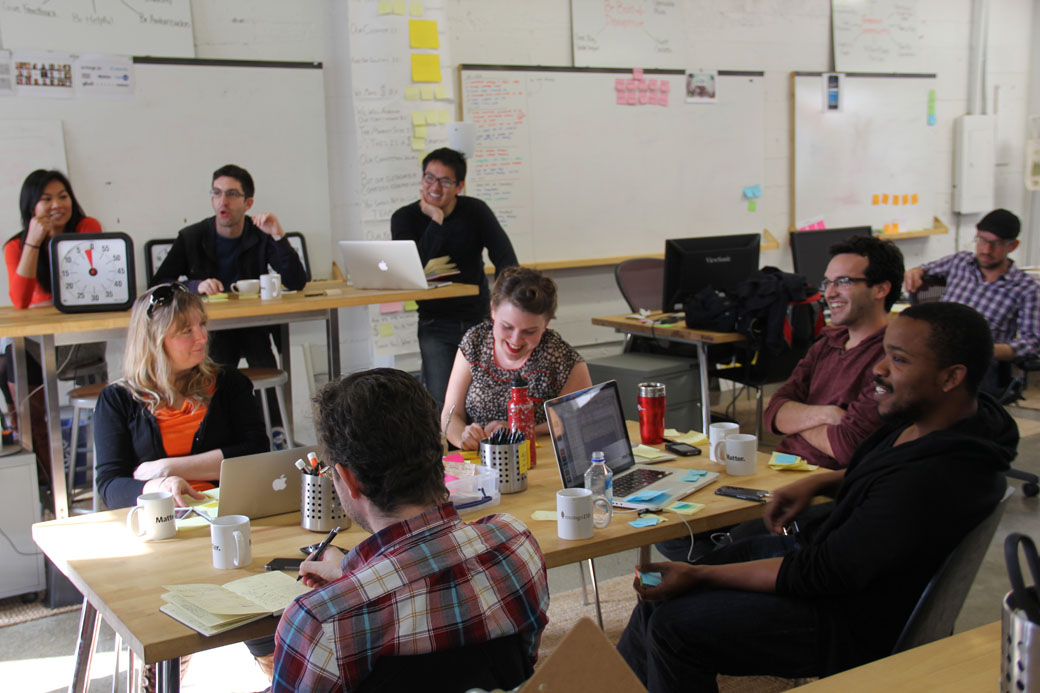
Matter’s second class preps for pitch day
Above: The Matter Two class listens and provides feedback to each other, during a practice pitch session on Feb. 13. Photo credit: Vignesh Ramachandran for Knight Foundation.
On a busy street in the heart of San Francisco’s “SoMa” neighborhood, there is an information revolution underway in a bright converted garage. On Thursday, the startup community will find out what’s been developing within the walls of Matter, a media accelerator, since October.
Seven companies will pitch to a packed room for Matter’s Demo Day, the culmination of a five-month program that mentors the startups and refines their products and services.
Matter – which was founded with investments from Knight Foundation and KQED in partnership with PRX – invests $50,000 in teams to build a sustainable venture through a user-centered and prototype-driven process. The accelerator’s second class of startups – dubbed “Matter 2” – will hold a second Demo Day Feb. 25 in New York. Demo Days are the pinnacle of the program, with the hope that investors might help propel the startups forward with more seed funding.
Each team has seven minutes to pitch its media venture. The companies range from a platform that crowdsources creative work from mission-driven artists – Creative Action Network – to an analytics tool for journalists to better measure a story’s performance and its social impact – Beat Root.
In the days leading up to Thursday, the companies perfected their pitches and refined story arcs to effectively share their venture’s narrative and path forward. For Matter Managing Partner Corey Ford, Demo Day is “like a wedding”: Something will go wrong and teams must react appropriately.
“Entrepreneurship is like improv,” Ford said. “Everybody’s looking at you to see … if you’re walking on a tight rope and you start to slip, are you able to pull yourself back up or do you just cry and fall?”
That’s why Ford is encouraging the entrepreneurs to “embrace the imperfection of the moment.”
“The pitch is really the beginning of the fundraising process,” said Martha Rotter, co-founder of digital publishing platform Woopie (Write Only Once, Publish It Everywhere). “Whatever happens on Demo Day, it’s what you do after that that’s going to matter. So in the back of our heads, we’re thinking about lists of investors to approach, and the different slides and documents that you need to do that, getting introductions, setting up specific demo sites for them to use, setting up things to get their attention.”
Woopie co-founder Stewart Curry added that the teams still have to run their business while preparing for Demo Day: testing and developing ideas and enhancements for the next version.
Connu co-founder Niree Noel said her company planned to get a lot of work done ahead of time so she and co-founders Susannah Luthi and Joseph White won’t have to worry about operational issues during Demo Days. Connu curates short stories from emerging writers in a sleek app that features text and audio.
“That’ll be good training for raising, because you kind of have to put certain things on hold,” Noel said. “Matter really prepares you for a lot of this stuff.”
Ford said part of the process is “going from complexity to simplicity.”
“It’s knowing after endless testing and iteration, knowing what overall is most important for your business and how to communicate your business,” Ford said.
Vignesh Ramachandran is a Bay Area journalist and consultant for Knight Foundation.
Investors interested in attending Matter’s Demo Days should email [email protected]. Applications for Matter Three are open through March 1. To check out Matter’s portfolio of companies, visit matter.vc.
Recent Content
-
Journalismarticle ·
-
Journalismarticle ·
-
Journalismarticle ·


